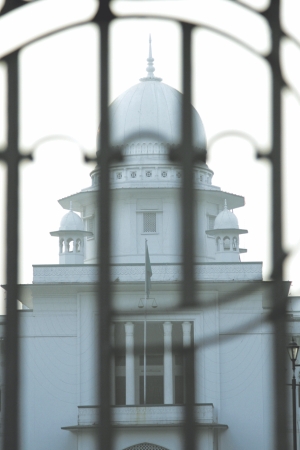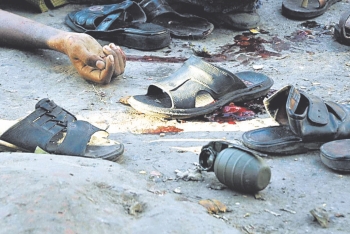| Home - Back Issues - The Team - Contact Us |
 |
| Volume 11 |Issue 03| January 20, 2012| |
|
|
Opinion Victor takes the Spoils Syed Maqsud Jamil
The eminent jurists of Bangladesh are critical with the continuing process of packing the country's judiciary with nominations of their choice. This is not a recent phenomenon. The last government in power appointed 45 judges of their choice during their tenure. They have been overtaken by the present government. In their last three years they have packed the higher court with 54 new judges of their choice. In Bangladesh this is the procedure of making the judiciary a compliant branch. The intent is quite evident and politicisation is a fact of governance in Bangladesh, only that since this is their field, the jurists have questioned it. The government has recently taken a decision of raising the retirement age of government officials from 57 to 59 years. This is not a major departure from the standard practice in other countries of the world. In United States the retirement age of government officials ranges between 65 and 70 years, depending on benefits. In the United Kingdom the statutory default retirement age is 65 years. There are however people who find a dubious intent of political nature in the generous act of the government. The principal beneficiaries of this decision will be a passel of powerful bureaucrats who keep a good eye over the political fortune of the party in power. The government has done what its opponents had done. Their opponents when in power, in the last term, followed the same path for the judiciary. They raised the retirement age of the judges so that their faithful becomes the head of the caretaker government when he retires. When hell let loose, the retired justice opted out of the line of fire. Another recent act of politicisation of public office by Bangladesh government is its decision to induct party functionaries into the Zilla Parishad (District Council). Critics castigate it as desperation of the government to put its men in different tiers of the administration to serve their party interest. Desperation as it has been pointed out is the result of the fact that the government has only two more years left and the clouds over national poll looks like a battle in hand. Authoritarian regimes and desperate governments in many parts of the world and in different times have records of using police and other law enforcement agencies in enforcing their will on the land and spitefully carrying out their programmes. Even elected governments when they stray away from political uprightness immeasurably harm government institutions by politicising them. In Bangladesh the opposition called a general strike. This time the chief whip of the opposition in parliament was in the field. It was a bad day for him; he was thrown to the ground and roughed up by the scornful cops. It was an irony that as a part of a set up the boorish cop involved was shown admitted in police-hospital. A proceeding was going on in a higher branch of the judiciary of Bangladesh, hearing the complaint against the leader of the opposition for her irreverent remark about the court's verdict on scrapping the caretaker government. Predictably, a scuffle broke out and a missile was thrown reportedly by an opposition lawyer. As things followed the opposition lawyers were under siege. A truce was worked out and the opposition lawyer made his way to his house. A midnight raid by the cops took him to the police station. There the gentleman fell seriously ill and was taken to the hospital, where he died. There is widespread allegation of torture in police custody. It now appears that the police force is the most potent spoil that a victorious political party in national poll can take and use it to lethal effect.
A politicised administration is a legacy that the two major political parties of Bangladesh share in common. When the present opposition was in the government the deadliest political carnage of the present parliamentary democracy took place. The present prime minister was in the middle of the carnage. A stupefied Bangladesh was witness to a grisly scene of brutal killing, with dead bodies all around. It was a case of culpable apathy. There was only an understaffed police contingent around the political rally of an important political party of the country. In a blood splattered sari an active female politician of long standing, a close confidant of the present prime minister and the wife of the present president of Bangladesh lay slumped on the ground with the last vacant look on her face. The shocking coincidence about the carnage is that the intelligence agencies carried themselves in an unflappable manner that they had no inkling that a monstrous political killing was going to take place. Besides the dastardly part about it was that the head of the cops was on a foreign visit on that day. Such was the moral torpor of the state television that there was complete blackout about the carnage in its news bulletin. When the opposition was in power they had a dapper home minister. He was much exuberant about running the department and effusive about the successful expeditions against the mafias. His exuberance and effusiveness led him to set up a special rapid action unit in black uniform to liquidate the mafias. In a highly politicized administrative set up it became a killing squad. Extra-judicial killings became a forte of the squad. The squad was already much tainted in the eyes of the human rights bodies. The fact remains that it is an intemperate hand of law in a politicised administration. The present government came it did not lose its clout. The number of extra-judicial killings and cases of maiming has not declined. History has many examples of politicised governments. For elected governments, the first such notable example of spoils system is the tenure of Andrew Jackson the seventh president of United States. The spoils system is the practice where a political party after winning an election gives government jobs as rewards for working towards victory and as an incentive. After his inauguration in 1829 he lavishly rewarded his supporters retiring 912 government officials. New York senator William L. Leahy criticised Jackson using the phrase 'to the victor belongs the spoils…' Ultimately, the Pendleton Act of 1883 of bi-partisan civil service commission stabilised the course. The present government of Bangladesh has taken an implacable stand of holding the next national poll under the political government. There is nothing wrong with it since it is the system all over the world. Bangladesh and to a certain extent Pakistan are the exceptions till the Supreme Court verdict of scrapping the caretaker system. Even the landmark verdict could see the perils of running headlong into scrapping the system and discreetly advised in favour of keeping the system for the next two polls. Politically Bangladesh is divided into two halves on the basis of support for the two major parties; almost 80 percent of votes cast. A difference of 5-8 percent decides the winning margin when a big tilt occurs. Even poll results under caretaker government were questioned for covert rigging and ballot box packing. When the lack of trust between the two parties is abysmally poor the believers in fair poll under a politicised government will only belong to the victorious party. The genie of the lamp in the context of Bangladesh will only serve the party, which has the lamp.
Copyright
(R) thedailystar.net 2012 |

